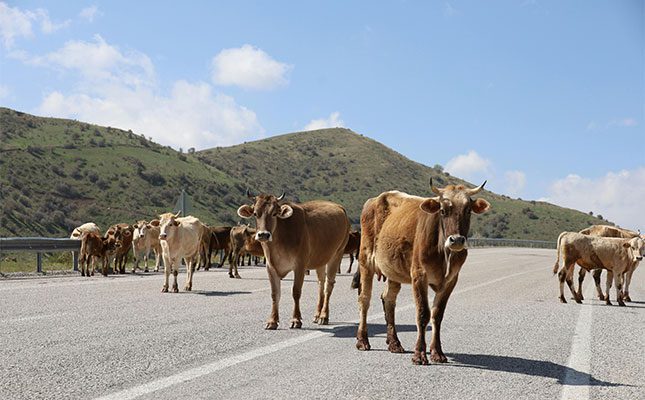
Within the disease management area (DMA), farmers are reporting communal cattle moving unchecked between neighbouring farms, along public roads, and into industrial areas. Concerns are mounting that this movement could further spread foot-and-mouth disease (FMD).
Speaking to Farmer’s Weekly, livestock farmer Cornay Botma said the situation was untenable.
“There are around 250 of [these animals] in the red zone, free walking without any hindrance. They are not quarantined. They walk freely into neighbouring places, against the border where our animals stand. That spreads the virus straight through the district,” he said.
Botma added that quarantined farms faced major production and financial challenges, while others flouted the rules without consequence.
“[Quarantine farms] can’t market our animals, we can’t move them to where grazing is available, and we can’t manage breeding seasons properly. How can we be expected to stick to quarantine rules if things keep going like this??”
According to him, despite repeated inspections, no cases of FMD had been detected on his farm, yet blood test backlogs meant he remained under quarantine.
“We are waiting four to six weeks for results. In the meantime, I cannot separate bulls from cows, manage my breeding season, or sell unproductive animals. This delay has enormous financial implications,” he explained.
According to the Free State Department of Agriculture and Rural Development, it had acknowledged farmers’ frustrations but insisted the quarantine measures were being applied fairly. Acting Director of Veterinary Services Dr Jurgens Barnard said all farmers in red zones were subject to the same conditions.
“All farmers in the quarantined zones have been placed under precautionary or full quarantine, where the animal owners agree not to move cloven-hooved animals without written permits from the state veterinarian. Where illegal movements are reported, cases will be investigated and opened with the police,” Barnard said.
He added that restrictions were essential to contain the FMD outbreak and safeguard the entire livestock sector.
“Compliance is critical to containing FMD. The economic impact of non-compliance can be severe, as seen during the previous outbreak when export losses reached an estimated R500 million annually,” he explained.
Acknowledging challenges such as limited staff and vehicles, Barnard said steps were being taken to strengthen enforcement and communication.
“Farmers are our eyes and ears, and we ask them to report any non-compliance immediately. We are also mobilising additional officials and issuing regular updates through media and farmer platforms,” he said.
Get trusted farming news from Farmers Weekly in Google Top Stories.
➕ Add Farmers Weekly to Google ✔ Takes 10 seconds · ✔ Remove anytime






